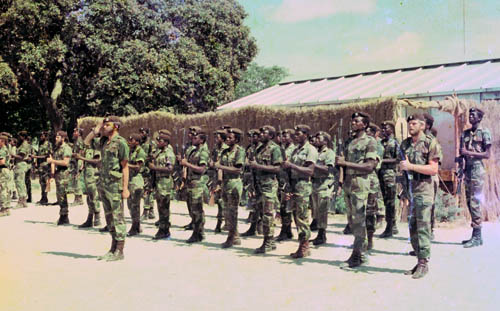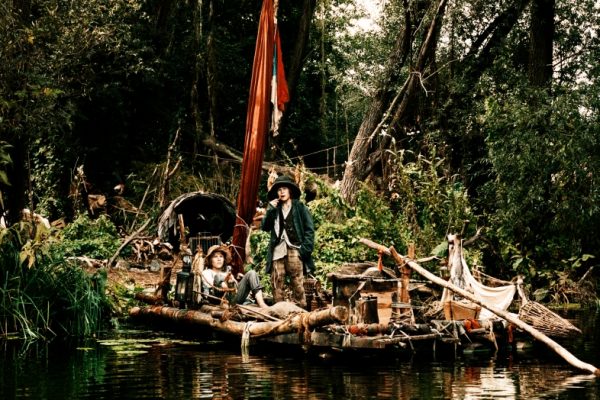My mom grew up during the Rhodesian Bush War, a guerilla terrorist war that is hardly ever spoken about and I’ve never heard mentioned outside of our family. I know it happened and you can check it out yourself on Wikipedia, but since Rhodesia changed to Zimbabwe I suppose that the horrors people faced during this period were lost under the shadow of Robert Mugabe’s destructive insanity, which has had more media attention than the war that eventually brought him to power. Who wants to talk about the war of a country that officially no longer exists except for those who survived it?

My mom always speaks fondly of her childhood. She grew up in a big family with lots of brothers and sisters. Our family get-togethers when I was a kid hosted up to seventy people, which was always a bit of a shock to the system when you invited friends over. Her father was a big man, tall, with a straight back and was as rigid in his posture as his outlook in life. He had been a Rhodesian boxer, a Rhodesian police officer and a Rhodesian coal miner. He once killed a charging buffalo with a single shot from his rifle. I only have small memories of him. Sitting in a high chair while watching him throw streamers across the dining room table, his slicked, brill creamed side parting so stiff it looked like black ice and riding his wheelchair on a giant brown balcony floor, pushed by my sister while the sky turned red. In all of these memories, the rooms are much bigger than they were in later recollections.
With her sisters, my mom grew up in the jungle and heat of the deepest Africa. She would fish; pulling worms out of the ground. She terrified iguanas while swimming in the river and spent so much time without shoes on that her feet were more tanned than her legs. She went to boarding school and was expelled for political graffiti (she vandalised a wall with white-shoe polish) and saw her brothers collected from school and shipped off, one by one, to go train to fight in a war. They were sixteen at the time.
My mom talks fondly and happily about her childhood and my sisters and I grew up believing that she lived in an African version of Tom Sawyer and Huckleberry Finn.

Real adventures. Not the kind of boring, city-dwelling, flavourless jaunts that my sisters and I went on. This was a time of real adventure and a pocket of history now mostly overlooked by the world’s scholars and Internet memes.
My mom does not mention much of the war that lasted fifteen years, it was just something that was happening on the periphery, like these wars often do. She doesn’t speak about how, as a school girl, she and her class mates had to take terrorism survival drills, or how more than once she found herself hiding under her desk while bullets shattered her classroom windows. Instead, she talks about how she was a high jump champion who used to do the scissor kick because she didn’t like the Fosbury Flop. She doesn’t talk about how one of her best friends was tied to a tree and raped by terrorists before being bayonetted and left to die. No, she tells me about how she and her sister once tried to smoke dried cow dung (they only tried it once). She doesn’t talk about the times she and her siblings returned home after school to find that their house had been emptied and that they no longer had a roof over their head. No, she tells me about walking on the railway tracks and trying to hit trains with sticks.
She doesn’t speak about how the war was known as one of survival, with unspeakable atrocities committed in the former Belgian Congo, the Mau Mau Uprising campaign in Kenya and elsewhere in Africa. She doesn’t speak about how she watched her country, her home, fall from being one of the highest standards of living in Africa to being a political joke. It was the same war that brought Robert Mugabe into power, which has since reached the general consensus of being a huge mistake.
It is overlooked because in terms of casualties, it was not a particularly costly war with 20,000 men, women and children being killed. From December 1972 to December 1979, 1,361 members of the Rhodesian security forces were killed, along with 10,450 guerrillas who were killed in Rhodesia and an unknown number in Mozambique and Zambia, 468 white civilians, and 7,790 black civilians in total. You should have a read at www.rhodesia.nl.
My mom claims she doesn’t remember the horrible times, only the heat, the freedom and the fun. She makes the conscious decision to only speak about the times that made her laugh and the adventures that made her heart pound. Her world, the country she grew up in and the war that almost cost the lives of so many of her brothers doesn’t exist anymore on paper or map, but the memories remain.
My mom is my hero because she doesn’t talk about those dark times, but her children and her husband know that she remembers. Life sometimes leaves us with scars so deep that nobody else can see them, but they form a cage around some of the hardest and darkest memories that we harbour. It weighs a lot to hold onto but not share the sharper experiences of life that shaped you into who you are and as it becomes a burden, it must be very easy to let it guide your decisions, change who you are and make you into something intrinsically different. My mom doesn’t. She keeps it quiet and keeps it private. She smiles, she loves, she dotes over her grandchildren and is fiercely protective over her family. You see her and you see someone whose past has made her stronger.
She is one of the strongest people I have ever met because she is irrefutably kind. This is why my mom is my hero.





